eClinicalWorks Blog

- 3 May, 2024
- blog
The Bots Are Here to Help
From front office to RCM, robotic process automation can help the bottom line Is there anything better than finding free money? The Wall Street Journal recently reported on a Pennsylvania-based sustainable-waste processing company, Reworld, that is reclaiming some of the estimated $68 million in coins that Americans toss in the trash every year. It turns out that those pennies, nickels and dimes add up. Reworld has recovered about $10 million in coins over seven years. Clear (and cleaner!) savings through RPA Healthcare practices have even more powerful and more lucrative ways to capture savings — ones that don’t require sorting, washing, and counting small metal discs. That path to better financial health involves applying artificial intelligence (AI) and Robotic Process Automation (RPA) to day-to-day operations. It is among the most financially sound steps any practice can take. Why the money and savings matter As every practice administrator knows, billing costs are enormous. A recent Health Affairs report found medical practices spend about $30 billion annually on billing. That is likely a low estimate, as it is based on data from 2009.
Continue Reading
- 26 April, 2024
- blog
Scaling Your Practice for Success
Imagine that you are a small medical practice with a handful of providers and staff serving thousands of patients. You studied the market and identified a growing need for the services you offer. You chose a great location. You selected eClinicalWorks® and healow® for documentation, practice management, and patient engagement. Your first priority is serving current patients, but you know that long-term success will require growth. Soon, you will face the challenge of attracting more patients. Will you have the personnel and tools necessary to serve them? How will you solve the scalability puzzle? A good option — and a better one You could take the slow and steady route: Be patient, serve your existing patients well, and trust that as your reputation and resources grow, you’ll be able to add staff and patients. That may work, but there’s a better and faster way to achieve scalability. eClinicalWorks and healow offer dozens of innovative solutions. Any one of them can expand efficiency and capacity to some degree, but the combined effect of implementing multiple solutions can truly transform your practice.
Continue Reading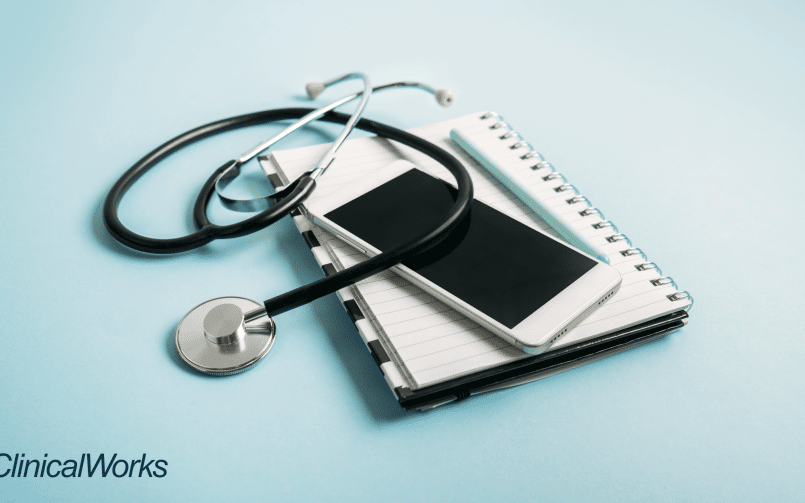
- 18 April, 2024
- blog
Support Value-Based Care with Sunoh.ai
AI medical scribes are becoming important for providers looking to deliver better, cost-effective care. Clinical documentation is the foundation of better healthcare delivery. It ensures continuity and quality of care, allowing healthcare professionals to track a patient’s health journey. Simplifying the documentation process allows doctors to spend less time on manual, repetitive tasks and more time with patients. Value-Based Care Providers understand that each person is unique. Value-based care focuses on the patient experience, quality of care, provider performance, and controlling costs. This is where AI-powered ambient listening technology – like Sunoh.ai – comes in. It is a key component of patient-centric care, helping to facilitate a personalized experience that promotes improved health outcomes for each patient. Sunoh.ai takes care of the clinical documentation, freeing providers to spend more face-to-face time with their patients. According to an article in NEJM Catalyst, physicians and hospitals can level up their coordination through shared data, ensuring that everyone involved in a patient's care has access to the same information. This reduces the duplication of tests and ensures that the treatment plan is appropriate and effective. Sunoh.ai is EHR-agnostic; it integrates with any EHR – including yours. This enhances interoperability, ensures smoother data transitions, and provides more efficient, effective, personalized care, all essential to value-based care.
Continue Reading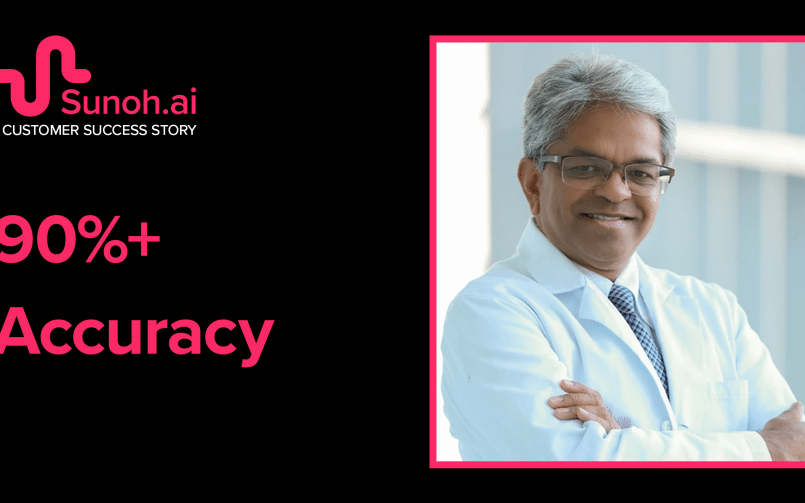
- 11 April, 2024
- blog
Revolutionizing Visit Notes with AI-Powered Ambient Listening Technology
Regional Medical Associates Streamlines Clinical Documentation with Sunoh.ai, Saves Up To 90% Time. Technology that saves time and improves efficiency is a game-changer. For most medical professionals, clinical documentation, while crucial, has always been a time suck. Accuracy is paramount. That means spending time manually documenting patient information rather than focusing on patient care. Regional Medical Associates (RMA) discovered a solution to this challenge with Sunoh.ai, a cutting-edge AI medical scribe.
Continue Reading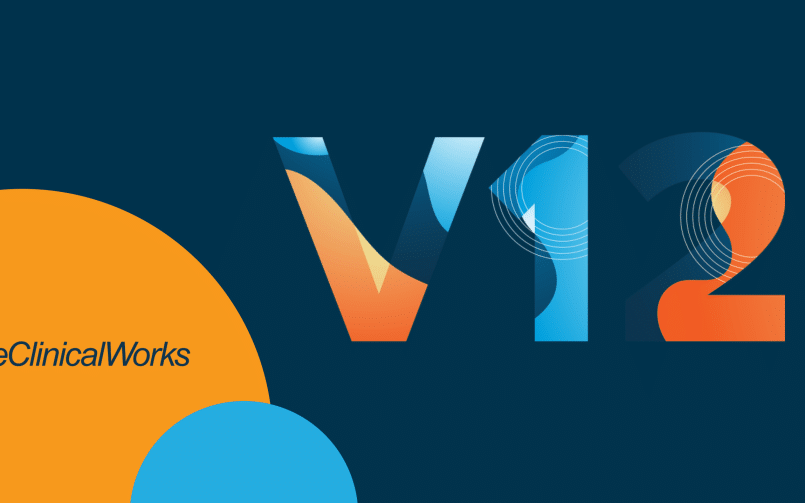
- 4 April, 2024
- blog
Leveraging AI: eClinicalWorks Reimagining Healthcare Delivery
The HIMSS24 Global Conference & Exhibition was the center of groundbreaking insights and cutting-edge technologies that will revolutionize healthcare systems. Among the highlights were eClinicalWorks® (eCW) solutions, showcasing how artificial intelligence (AI) is reshaping the healthcare industry. As a leading healthcare IT solutions partner, eClinicalWorks showcased AI's transformative potential in enhancing productivity and streamlining workflows. The AI-powered solutions integrate with over 30 different areas of the eCW Electronic Health Record (EHR) system, providing a powerful and versatile tool for healthcare professionals to manage operations. eClinicalWorks V12 is the first AI-powered EHR, marking a significant milestone in the adoption of AI in healthcare. Solutions ranging from the AI assistant for PRISMA to Image AI, Sunoh.ai medical AI scribe, Robotic Process Automation (RPA), and more are instrumental in enabling providers to succeed in value-based care and enhancing patient experience. These solutions aim to improve healthcare services by reducing the burden on providers while increasing the accuracy, effectiveness, and personalization of their work.
Continue Reading
- 28 March, 2024
- blog
Boosting Billing Efficiency with the Clinical Rule Engine
Artificial Intelligence (AI) for Robotic Process Automation (RPA) through Automated Playlists uses multi-screen navigation to reduce time spent on repetitive manual tasks, which enhances efficiency. This functionality is key to the effectiveness of the Clinical Rules Engine (CRE). It’s a powerful tool that has revolutionized the way providers handle billing and coding. It automates the process of applying billing codes based on documentation, streamlining operations and minimizing the possibility of human error.
Continue Reading
- 22 March, 2024
- blog
Generative AI Integration into the EHR – Welcome to the Healthcare Revolution
Artificial Intelligence (AI) is transforming the healthcare industry with its increasing capabilities in supporting patient care. Its numerous applications are paving the way to a more personalized, efficient, and proactive approach. By embracing AI, we’re driving quality care and improving patient outcomes. Large language models, like generative AI, are leading to substantial advancements and are setting the stage for a healthcare revolution. eClinicalWorks® (eCW), for example, has taken a lead in this revolution. Just last year, eCW integrated its EHR and Practice Management solutions with cognitive services and machine learning models from Azure OpenAI Service to combine advances in generative AI models with eCW solutions.
Continue Reading
- 14 March, 2024
- blog
Revolutionizing Work-Life Balance with a Smart AI-Driven EHR
The role of an AI medical scribe is becoming more and more significant in the clinical setting. AI medical scribes within EHR systems reduce the time providers spend on documentation and charting activities outside clinic hours, leading to better work-life balance. Last year, eClinicalWorks® introduced a series of AI functionalities to reshape the future of EHRs and announced its integration with AI medical scribe Sunoh.ai. This blog explores the real-world impact of AI-enhanced record keeping—from reducing time spent on administrative tasks that often lead to physician burnout to providing frontline workers with actionable insights for patient care.
Continue Reading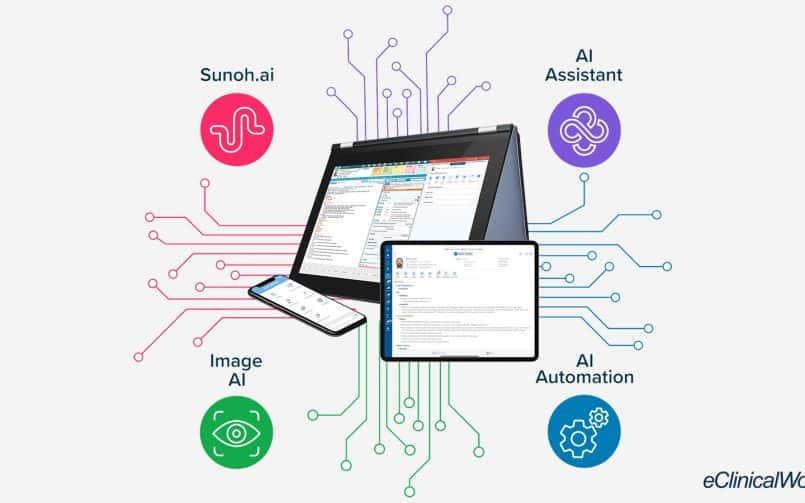
- 7 March, 2024
- blog
Enhance Care with AI-Driven EHR and AI Medical Scribe
The introduction of Artificial Intelligence (AI) to the field of medicine and its integration with Electronic Health Records (EHR) is revolutionizing healthcare. A recent study of the use of AI in healthcare, ‘Clinicians’ Views on Using Artificial Intelligence in Healthcare: Opportunities, Challenges, and Beyond’ states due to Generative AI and machine learning algorithms, healthcare data is being harnessed like never before, creating a paradigm shift in healthcare delivery.
Continue Reading
- 1 March, 2024
- blog
PRISMA AI: Pioneering Value-Based Care Through Advanced Interoperability
Advanced interoperability eliminates data barriers, facilitating seamless communication. For years, healthcare providers have struggled to access patients past medical records. Patients receive care from multiple healthcare facilities. Access to patients’ full medical history is imperative for effective routine or emergency care. They may be required at a patient's usual point of care or a visit to a new location. Ideally, patients can recall their full medical history. However, providers should have access to patient information at the point of care.
Continue Reading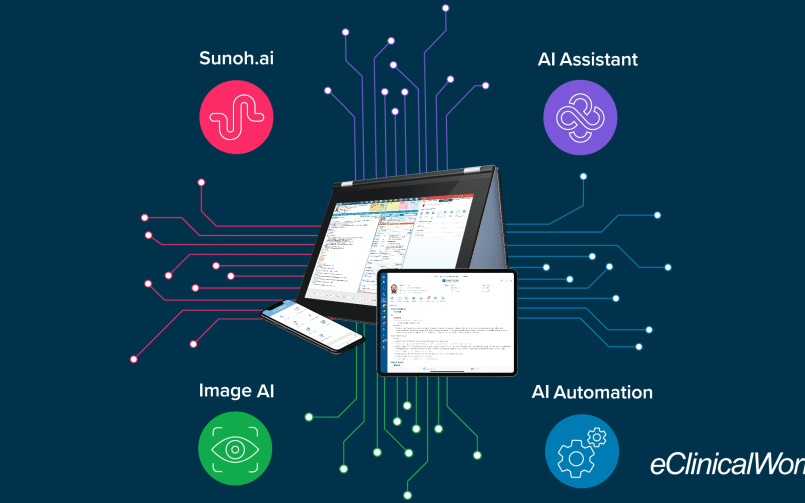
- 23 February, 2024
- blog
With an AI-Powered EHR, Sunoh.ai, and healow Patient Engagement, eCW is a One-Stop Solution for Small and Independent Practices
Personalized care is a hallmark of small and independent practices. Providers often are on a first-name basis with their patients and are aware of their medical histories. However, this personal touch comes with its own set of challenges. Small practices have fewer staff members. This puts physicians into multiple roles. Along with patient care, they handle administrative tasks and business operations. They may struggle to market themselves effectively to attract new patients. With limited resources, scaling is complicated. As patient numbers grow, tasks like scheduling, billing, and record-keeping can become overwhelming, leading to burnout. According to a 2019 survey, primary care providers (PCPs) report a 79% burnout score attributed to direct and indirect care. Smaller practices may also struggle to keep up with the rapid pace of technological advancements. These challenges can seem daunting. But with the right tools, such as eClinicalWorks® (eCW), an AI-powered multidimensional EHR – Sunoh.ai a natural AI scribe – and healow® patient engagement solutions, small and independent practices can streamline operations, effectively manage resources, and continue to provide personalized care while scaling their business.
Continue Reading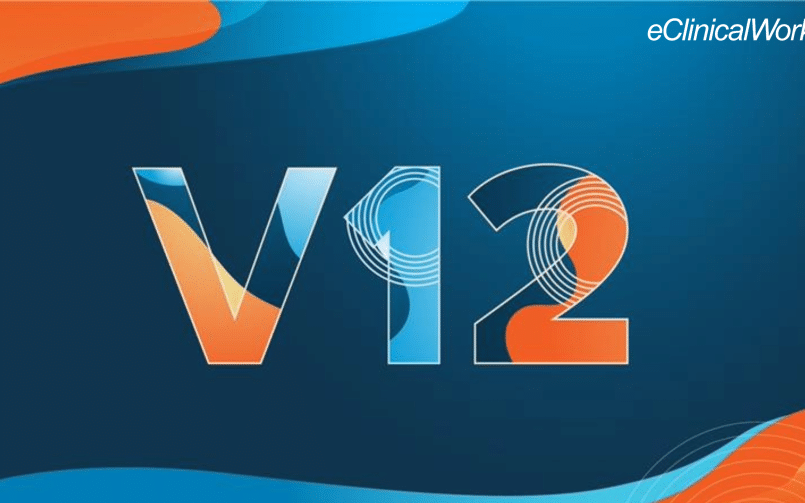
- 20 February, 2024
- blog
A Provider’s Perspective On Enhancing Clinical Workflows with eCW V12
With technology changing at what seems like the speed of light, eClinicalWorks® (eCW) is developing innovations to speed up your documentation process. Dr. Mustafa Ammar, Chief Medical Officer at Ampla Health, joined our podcast at our 2023 National Conference to give us his perspective on how his organization is leveraging these innovations. Ampla Health made the move to eCW V12 in June 2023 with no issues or hiccups. (Dr. Ammar called it a ‘blockbuster.’) Providers were ecstatic as V12 improved a tremendous number of the functionalities they were using on a daily basis.
Continue Reading